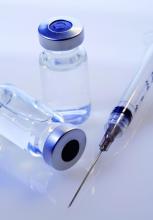, while children with kidney or lung disease may need only one dose, reported Sabelle Jallow, PhD, of the University of the Witwatersrand, Johannesburg, South Africa, and associates.
An open-label study was conducted at Chris Hani Baragwanath Academic Hospital (CHBAH) in Soweto, South Africa, to determine the immunogenicity of one and two doses of PCV13 in vaccine-naive children with HIV infection, kidney disease, or lung disease. Of the 112 children in the study, there were 50 HIV-infected children, 8 children with kidney disease, 9 with lung disease, and 45 HIV-uninfected control children with no chronic illness. The average age at enrollment was 62 months, 53% of participants were female, and 96% were of black African descent. At-risk children were given two doses of PCV13, 2 months apart, while control children received only one PCV13 dose (Vaccine. 2017. doi: 10.1016/j.vaccine.2017.06.081).
Children who were infected with HIV or who had kidney and lung disease had similar positive responses to PCV13, compared with control children, with the exception of a few serotypes. “The at-risk children had lower [geometric mean concentrations] for serotypes 3 and 14 (except the lung disease group post-first PCV13 for serotype 14), compared to control children,” Dr. Jallow and associates said. Findings after the second PCV13 dose in both the kidney disease and lung disease groups suggested that the second dose did not have an effect. Fortunately, the responses to the initial dose appeared to be sufficient, so only one dose is likely to be required in these populations.“In future studies, a larger spectrum of comorbidities should be included to determine the most cost-effective vaccination regimens particularly in low income countries,” the researchers noted.


